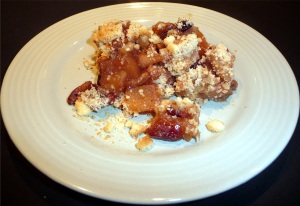My sister and her husband arrived today from Ontario and we are excited about spending time with them. Jane is as crazy about food as I am so we’re going to have some fun cooking up a storm and experimenting.
Two days before Christmas, I was not going to do a fancy dinner so this week I decided to focus on a meal that looked and tasted nourishing. I started off by deciding salmon was going to be the main ingredient and built the meal around that. The second thing I wanted to do was have at least three different coloured vegetables on the plate. Brussels sprouts are not my favorite vegetable, as a matter of fact I would rarely go out looking for them but this week my body told me I should load my plate up with them. Finding a recipe for Brussels sprouts that looked interesting was easy, I went back to Andrew Weil’s True Food cookbook again and on page 179 found “Stir-Fried Brussels Sprouts with Umami Sauce”.
What’s Umami Sauce you ask? Umami Sauce is made with very few ingredients: apple cider vinegar, tamari nutritional yeast flakes, garlic and extra virgin olive oil. You can make this up, put it in a jar in the fridge for a couple of weeks, and put it on vegetables and salads to add some extra flavour to any dish.
Nutritional yeast is an inactive yeast that has a nutty cheese-like flavor. Usually you need to go to a health food store to purchase it but my local “Save On” store had it in the organic bulk section. It is a source of B-complex vitamins, high in folic acid, is gluten-free and is a complete protein. It is a regular item in vegan diets because of it’s nutritional value and taste.
Roasted beets and baked yams were the other vegetables in this week’s dinner. The beets were scrubbed and cleaned up and placed in foil in an oven set at 375 degrees. They were roasted for approximately an hour. The yams were prepared much the same way, scrubbed, poked and rubbed with olive oil and placed in the same oven for about the same amount of time. You can cook these first and let them rest while you cook the salmon.
Seared Salmon with White Wine and Orange Glaze
- Six 4-5 oz salmon fillets
- 1 Tbsp sesame oil
- 1 Tbsp tamari sauce
- ¼ cup white wine
- 1 cup freshly squeezed orange juice
- 1 tsp. orange zest
- 3 Tbsp. sherry
- ½ tsp grated fresh ginger
Set the oven at 400 degrees
Put sesame oil in a frying pan and heat until hot. Once the pan is hot, place the salmon filets in the pan and sear for a minute on each side and place in a baking pan. Mix tamari sauce and white wine together and pour over the salmon pieces, place the pan in the oven at 400 degrees and cook for 10 minutes. Remove them from the oven.
While the fish is baking, take the remaining ingredients and mix them together in a small saucepan over medium-high heat until reduced by half. Remove from heat, drizzle the sauce over the fish and serve. This recipe is done in less than 20 minutes and the flavour is wonderful.
For dessert we had an apple cranberry crisp. Last fall we went out to a friend’s farm and picked apples from her trees. I stewed the apples with cranberries and ginger and canned them so they could be used throughout the winter. I took a jar and put it in a baking pan and sprinkled some GF shortbread cookies I made a couple of weeks ago over the top and popped it in the oven at 375 degrees and baked for 30 minutes. It was a lovely finish to another fabulous Sunday Night Dinner at Julia’s Place.
Nutritional notes taken from Dr. Weil’s website: (www.drweil.com):
According to Janice Bohac, a research geneticist and plant breeder at the U.S. Department of Agriculture’s Vegetable Laboratory in Charleston, SC, sweet potatoes are packed with nutrients (including carotenoids, copper, and fiber) and rank much lower on the glycemic index scale than white potatoes. That means that even carbohydrate-sensitive individuals can include these good carbs in their diets.
Beets contain phytonutrients called betalains that are potent antioxidants and anti-inflammatories. They are also rich sources of carotenoids that have been shown to help protect against eye diseases, especially those of the macula and retina. Compounds in beets have slowed tumor growth in laboratory studies, but further tests are needed to confirm anti-cancer benefits in humans.
High in fiber, Brussels sprouts are wonderful for the digestive tract and lowering the risk of colon cancer. They are high in folic acid, vitamin C, vitamin K and beta-carotene, and contain vitamin B6, thiamine and potassium. Eat them as fresh as possible to get maximum taste and nutrition, but if you get too many of them they can be blanched and kept in your freezer.
Salmon, like other species of fatty, cold-water fish, can be a potent ally in protecting heart health. In one Japanese study, individuals who consumed fish eight times per week had a 37 and 56 percent reduced risk of heart disease and heart attack, respectively, than those who consumed only one serving per week. But abundant omega-3 fatty acids are not salmon’s only nutritional virtue. It is also an excellent source of selenium (75 percent of the Daily Value for four ounces of salmon), which helps to regulate thyroid function and support the immune system; and vitamin D (over 100 percent of the Daily Value in the same amount of salmon), which promotes bone health and strengthens the immune system. Vitamin D deficiency (most adults in the United States do not get enough of this essential vitamin) is associated with an increased risk of depression, cancer and other diseases.


